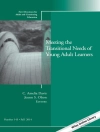Assessment is a fundamental issue in research in science education, in curriculum development and implementation in science education as well as in science teaching and learning.
This book takes a broad and deep view of research involving assessment in science education, across contexts and cultures (from whole countries to individual classrooms) and across forms and purposes (from assessment in the service of student learning to policy implications of system wide assessment). It examines the relationships between assessment, measurement and evaluation; explores assessment philosophies and practices in relation to curriculum and scientific literacy/learning; and details the relationships between assessment and science education policy.
The third in a series, Valuing Assessment in Science Education has chapters from a range of international scholars from across the globe and staff from Monash University, King’s College London and University of Waikato. The two previousbooks in the series examined research relevant to the re-emergence of values in science education and teaching across the spectrum of science education as well as across cultural contexts through the professional knowledge of science teaching. This third book now moves to examine different aspects of generating understanding about what science is learnt, how it is learnt, and how it is valued.
Valuing Assessment in Science Education will appeal to all those with some engagement with and/or use of research in science education, including research students, academics, curriculum development agencies, assessment authorities, and policy makers. It will also be of interest to all classroom science teachers who seek to keep abreast of the latest research and development and thinking in their area of professional concern.
Cuprins
Valuing Assessment in Science Education: An Introductory Framework, Deborah Corrigan, Cathy Buntting, Alister Jones, Richard Gunstone.- International Assessments of Science Learning: Their Positive and Negative Contributions to Science Education, Peter J. Fensham.- International, National and Classroom Assessment: Potent Factors in Shaping what Counts in School Science, Alister Jones, Cathy Buntting.- Improving Science Education: Why Science Matters, Robin Millar.- Towards an Authentically Assessed Science Curriculum, Peter J. Fensham, Léonie J. Rennie.- Aligning Science Curriculum Renewal Efforts and Assessment Practices, Wilmad Kuiper, Elvira Folmer, Wout Ottevanger.- Content to be Assessed Across the History of the National Assessment of Educational Progress, Audrey B. Champagne.- The Influence of Assessment on Moderating Science Teachers’ Beliefs and Practices, Deborah Corrigan, Rebecca Cooper.- Issues in Teaching for and Assessment of Creativity in Mathematics and Science, Mike Askew.- Science Teachers’ Understanding of the College Entrance Examination in a Climate of National Curriculum Reform in China, Hongming Ma.- Pedagogy in Theory and in Practice: Formative and Summative Assessments in Classrooms and in Systems, Paul Black.- An Assessment Perezhivanie: Building an Assessment Pedagogy for, with and of Early Childhood Science Learning, Marilyn Fleer, Gloria Quiñones.- Classroom Assessment: Making Space for Diversity, Bronwen Cowie.- Formative Assessment as a Cltural Practice: The Use of Written Formative Assessment in Samoan Science Classrooms, Desmond Lee Hang, Beverley Bell.- The Disparity Between Achievement and Engagement in Students’ Science Learning: A Case of East-Asian Regions, Jinwoong Song.- Embedding Assessment Within Primary School Science: A Case Study, Angela Fitzgerald, Richard Gunstone.- Formative Assessment in Learning to Teach Science, Pernilla Nilsson, John Loughran.- Changing Assessment Practices in Science Classrooms, Chris Harrison.- Assessment: Where to Next?, Deborah Corrigan, Cathy Buntting, Richard Gunstone, Alister Jones.












